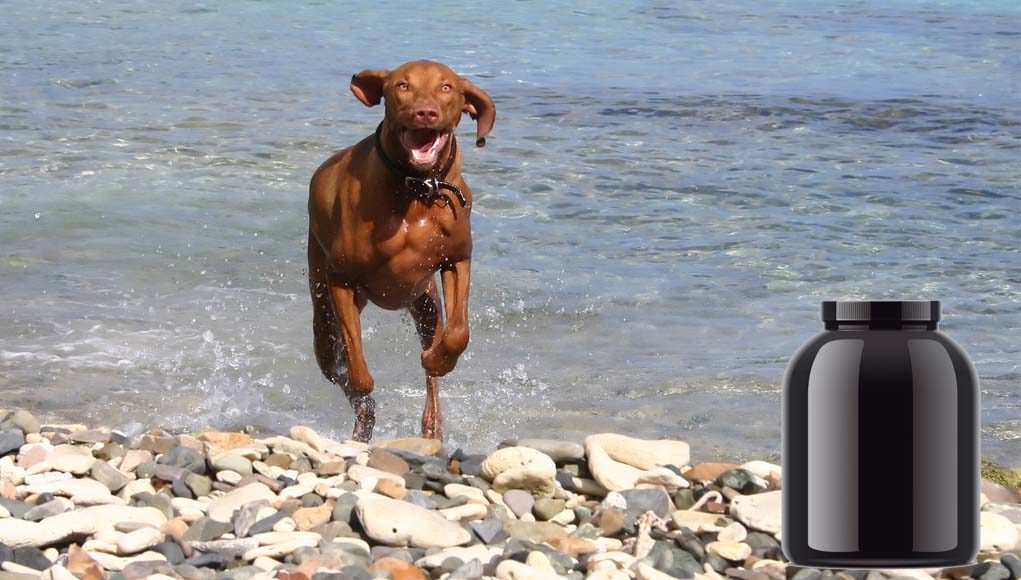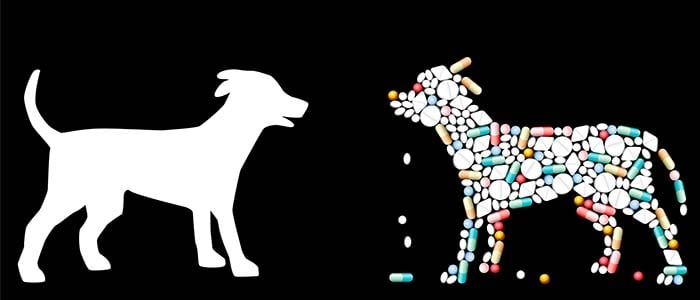Table of Contents
If your pet isn’t suffering from a specific health condition that could be improved upon with muscle supplements, or a veterinarian doesn’t prescribe or even suggest muscle supplements, then supplementing a dog’s diet with muscle-building vitamins or powders is generally up to the owner’s discretion.
In general, if there is no good health-related reason to use these supplements, they are not recommended, and a dietary adjustment should be followed instead to make the dog gain weight and muscle mass.
No matter the reason, dog owners should always confer with a pet care professional to ensure this is right for their pet.
Why Give Pets Muscle Supplements?
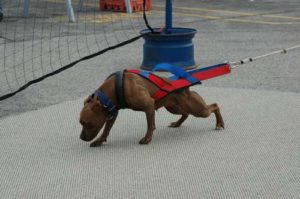 Muscle supplements are not just for Pit Bull and Bully breeds; they're not given to dogs for aesthetic purposes.
Muscle supplements are not just for Pit Bull and Bully breeds; they're not given to dogs for aesthetic purposes.
Below are some common reasons owners may consider giving a dog muscle supplements.
1. Build muscles
Some owners may simply want their dogs to appear more muscular.
The motivation behind this may be to give a guard or watchdog a more intimidating appearance as they help protect property and their people.
Others may want their pet to fit the description of a show dog better to improve their chances of placement and make them more competitively successful.
Owners of athletic dogs on a special diet may also give these supplements to optimize muscle building.
2. Build strength
Owners who routinely enter their dogs into competitions that have multiple categories, not just based on appearance, may choose to give their canine muscle supplements to make them stronger.
There are several dog sports where such supplements may be advantageous for the animal.
Agility competitions, one of the many canine sports, take place nationwide and year-round, and within their demanding yet enjoyable environment, the owners have just as much fun watching the event as their dogs do running, jumping, and hurdling around a challenging course.
These dogs often receive specialized diets, where supplements may be a part of them.
3. Gain energy
Something as rudimentary as changes in routine and/or diet may impact a dog’s energy level.
A change in routine could mean moving into a new home or even losing a loved one.
Often, dogs will express their uneasiness with a big life change or depression much like we do: losing interest in activities they once loved.
While time heals all wounds, supplements built to promote activity can give your pet the boost they need.
This could be an option if your pet is having a hard time keeping up with other animals in your household, friends at the local dog park, or even with competitors in local agility competitions you and your pupper love to enter.
If, however, their inability to keep up is the result of getting older, talk to your veterinarian, as the change in energy level could mean they’re experiencing joint pain or other health problems, and supplements may be ill-advised.
4. Correct a vitamin deficiency
Vitamin deficiency is a common ailment among house pets. A lot of this is attributed to a poor diet of kibble, canned food, or improperly balanced homemade meals cooked by their owner that do not provide them with all the nutrients their bodies require.
For animals not provided with enough valuable sources of Vitamin D or E, their muscles may not fully develop as puppies and/or their muscles may begin to deplete as they grow.
You may have reasons to suspect this is occurring in your pooch if you notice any of the following symptoms:
- Muscle weakness
- Lack of growth (in puppies)
- Lethargy
- Joint pain (inflammation)
- Bone deformities (typically in puppies)
A veterinarian and their staff will be able to test if this is what’s ailing the pup by evaluating enzyme levels in the blood.
In addition to blood tests, they may request hair and saliva samples to do a full search of potential vitamin deficiencies.
Vets treat this as a serious issue as it has the potential to lead to heart, kidney, and bowel diseases.
Important: Do not try to treat a vitamin deficiency in the dog yourself, particularly with muscle supplements, because an excess of vitamins can cause toxicity and a whole other slew of adverse effects.
Talk to your veterinarian and have the dog tested first.
5. Help with muscle atrophy
Muscle atrophy is a muscle-wasting condition seen most commonly in senior or overweight canines.
Animals with chronic thyroid issues, arthritis, or those suffering from obesity often develop muscle atrophy.
Recent studies have shown that appropriate supplementation of muscle-building proteins and nutrients can help greatly slow or stop the effects of muscle atrophy in dogs, giving your pet a healthier, happier lifestyle overall.
But once again, this must be determined by a veterinarian beforehand.
Ingredients of Muscle Supplements for Dogs
Many of these products will contain at least one or two of the following ingredients:
Creatine
Creatine is a naturally occurring amino acid derived from the liver that aids the body in building muscle mass.
While canines, like humans, create this acid in their bodies, particularly active dogs need an added dose of creatine, which they look for first and foremost in their diet.
However, from forest-dwelling wolves to common household pets, dogs’ diets may lack some essential nutrients, such as these amino acids.
You may bulk up your dog’s daily meals by adding freshly seared fish, which is high in protein and amino acids, including creatine, but there are also tasty dog treats concentrated with creatine you can purchase for your dog to consume between meals.
Maltodextrin
This property is responsible for energizing.
The maltodextrin component may be particularly important to working dogs, such as those on a K9 force, search-and-rescue member, or dogsled team.
Owners may choose muscle supplements with this additive for dogs with hobbies that require a lot of energy (agility courses, racing, hunting).
Maltodextrin is a product you may already be familiar with as it’s a common additive in human-grade foods.
In moderation, maltodextrin – a byproduct of corn starch – acts as a natural energizer that aids in muscle growth and revitalization.
Riboflavin
Otherwise known as Vitamin B2, this nutrient is hailed for its ability to help the body break down complex carbohydrates.
Once these carbs are consumed, they may either be stored as fat in the body or work to become muscle.
The correct amount of riboflavin is the difference between healthy muscle mass and less-than-healthy fatty mass.
Without B2, foods aren’t converted into Adenosine Triphosphate (ATP), which essentially is fuel for the body.
Because many muscle supplements for dogs are designed for owners of active canines, riboflavin is a common ingredient.
Protein
Whey protein and/or milk protein isolate will typically satisfy a muscle supplement’s most obvious and needed ingredient: protein.
This organic compound creates enzymes and releases them into the dog's body, and since enzymes are responsible for quickening many essential bodily processes, including the chemical reactions needed to build muscles, it’s clear why this is a common ingredient in pet muscle supplements.
Dog Muscle Supplements on the Market
Many muscle supplements for dogs, similar to weight gain supplements, are available online or at your local pet supply store.
Typically, these come in a powder form mixed with one to two cups of water.
Others may come in a pill or tablet form, giving them a treat-like appearance that’s sure to get your pet’s tail wagging.
It doesn’t hurt to use an excited tone when calling your dog to come and eat their daily supplement; your excitement will influence their attitude toward the new addition to their routine.
Many companies ensure these products are dog-approved with meaty, delicious flavors for them to enjoy, so you shouldn’t have to worry about your dog not wanting to take their supplement, but occasionally, you may need a strategy to encourage them.
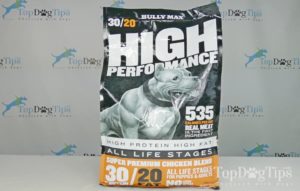 Using supplements separately isn't the only option either.
Using supplements separately isn't the only option either.
Some weight gain dog foods or performance foods for very active dogs may already include such supplements.
The most popular muscle gain food is Bully Max Performance Dog Food, which our editor Samantha reviewed here.
You can expect the dosage based on your dog’s weight and/or activity level.
The heavier or more active your dog is, the quicker they’ll go through the product.
One-pound containers typically cost anywhere from $12 to $25 and, depending on your dog, can last up to a month or longer.
Safety-Necessities of Muscle Supplementation
Because pet supplements can be a hit or miss, the first and most important step is to talk to a veterinarian or canine nutritionist before buying any such product.
After communicating to your pet’s veterinarian your intention to introduce dog muscle supplements into their diet, and if approved to do so, you should:
Always follow dosage directions
Trying to build muscles on your dog as quickly as possible by overdosing their food bowl with muscle powder is not a responsible way to promote canine health.
In fact, not following dosage directions, often based on your pet’s weight and/or exercise routine, could lead to toxicity.
Symptoms of toxicity in dogs include vomiting, diarrhea, stomach discomfort or pain, lethargy, as well as dehydration.
Routinely exercise your pet
Because these supplements contain protein and energy-promoting nutrients, you must do more for your dog than just let them wander around the backyard.
Take them for a long walk, play a long game of fetch, take a trip to the dog park, or encourage them to swim at the local watering hole.
Feeding your dog muscle supplements without an active outlet can cause weight gain rather than muscle building.
However, it’s also important to not overwork the canine, especially if they are young (6 months to 24 months) or old (6+ years).
Always talk to your vet about an exercise routine before putting your pet through something they cannot handle physically.
Consider a balanced diet
Supplements are best when working alongside a well-balanced diet, and they should not be used instead of a properly adjusted dietary regime; they can only supplement it.
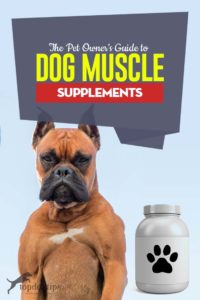 This may mean high-quality, natural dog food and/or building homemade meals for the dog yourself.
This may mean high-quality, natural dog food and/or building homemade meals for the dog yourself.
These meals should include a variety of whole meats rather than meat by-products (hot dogs or water-saturated dark meats) and dog-safe vegetables (dark, leafy greens).
Know that results take time
Be patient. Go into muscle supplementation with realistic expectations and steady your pet’s food, supplement, and exercise routine.
You will likely start seeing results within a few months as long as you stay the course.
READ NEXT: The Best Dog Foods for Pit Bulls to Gain Muscle


